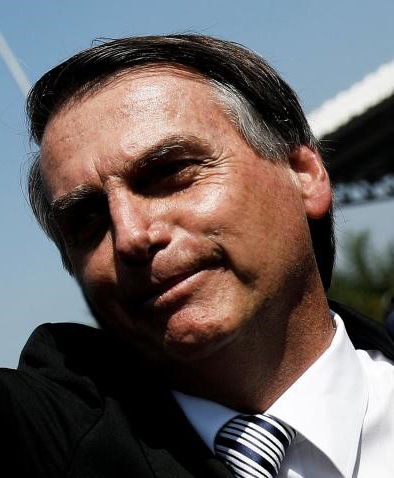RIO DE JANEIRO, (Reuters) – Brazil’s presidential front-runner said yesterday he would not leave the Paris climate accord if elected, going back on a prior pledge to follow the pullout by U.S. President Donald Trump, a role model for his anti-establishment run.
Right-wing Congress-man Jair Bolsonaro’s decision marks a surprising about-face for a candidate who enjoys strong support from Brazil’s powerful agribusiness lobby and has called conservation efforts a threat to Brazilian sovereignty.
Speaking at a news conference in Rio de Janeiro, Bolsonaro also said he that he wanted to work with the United Nations to deal with a large influx of Venezuelan refugees in Brazil’s north. He said he did not want conflict with the neighboring country, whose socialist government he has repeatedly criticized.
Brazil’s most polarized election in a generation has stirred political violence and threats against journalists, while Bolsonaro’s policy pledges have raised alarm among many, including environmentalists.
But Bolsonaro has been adopting a more moderate tone as he nears an increasingly likely victory in Sunday’s run-off election against leftist rival Fernando Haddad.
Bolsonaro’s lead narrowed slightly in a Datafolha opinion poll released late on Thursday, but he still has a commanding 56 percent of the vote to Haddad’s 44 percent. A week ago, the same poll had Bolsonaro with 59 percent and Haddad with 41 percent.
Bolsonaro had previously said that, if elected, he would pull Brazil out of the Paris climate accord due to disagreements over how the Amazon rainforest should be protected. Trump pulled the United States out of the accord in June 2017.
This month, a group of non-governmental organizations including Greenpeace and WWF-Brasil signed an open letter saying Bolsonaro’s proposals present a serious threat to Brazil’s environment that could lead deforestation “to explode.”
Brazil is home to about 60 percent of the Amazon, arguably nature’s best defense against global warming.
Earlier on Thursday, one of Bolsonaro’s senior advisers said in a video, without presenting evidence, that the candidate would not attend debates with his rival due to a threat against him from an unnamed “criminal organization.”
The video was posted on the Twitter feed of Bolsonaro’s vice presidential pick, retired General Hamilton Mourão. In it, retired General Augusto Heleno, a senior adviser to Bolsonaro and earmarked as his defense minister, denied the candidate was avoiding debates for fear of facing his leftist rival.
Instead, Heleno said there were credible threats against Bolsonaro from a criminal group.
“He’s really threatened,” Heleno said. “Not just a sniper, it’s a terrorist attack where there’s a criminal organization – I’m not going to name it for obvious reasons – involved, proven by messages, wiretapping, so it’s absolutely true.”
Reuters was not immediately able to reach Mourão or Heleno for comment.
Bolsonaro and his team have given various reasons for why he refuses to take part in the debates. In the past, his poll numbers have suffered after debating, as he faltered under tough questioning.
A seven-term congressman, Bolsonaro, 63, has successfully pitched himself as the anti-establishment candidate, appealing to voters fed up with political graft and violent crime.
But he remains a divisive figure and the election has seen reports of violence, stoked by a febrile atmosphere and fake news reports on social media.
Various press advocacy groups said on Thursday they were concerned by a rise in threats against journalists, urging presidential candidates to denounce the attacks.
“Scores of reporters have been harassed, threatened, and in some cases physically attacked,” said a statement signed by groups including Article 19, the Committee to Protect Journalists, Human Rights Watch and Reporters without Borders.
Bolsonaro said last weekend that he would seek congressional approval so that troops could patrol the streets of Brazil, which suffered a record 64,000 murders last year.
In an interview on Thursday, Defense Minister Joaquim Silva e Luna said he was against such a move.
“It needs to be a case by case basis,” he told Reuters. “Beyond that, I’m not in favor of using the armed forces all the time.”
Silva e Luna said he supported Bolsonaro’s proposals to give soldiers and police greater legal protection during dangerous missions, as long as it did not cause more deaths.
“I don’t want to give carte blanche for the armed forces or public security forces to kill,” he said.

